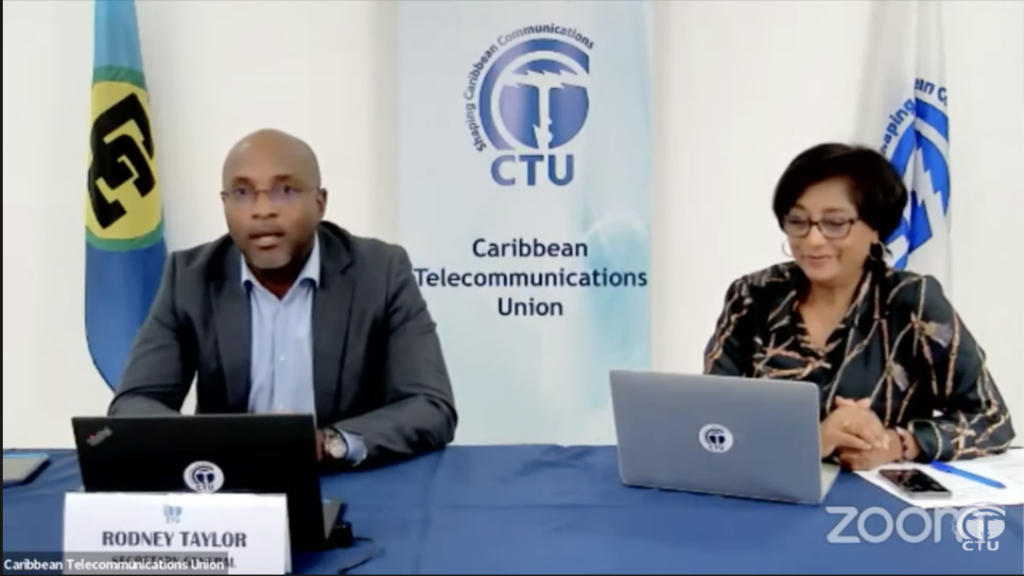Information Communication Technology (ICT), while a fundamental element, in and of itself, is only part of the solution needed to support the online delivery of content and the eventual digital transformation of the education system for Caribbean students. This is the main take-away from the Caribbean Telecommunications Union’s ICT in Education-A Caribbean Forum.
Caribbean educators, technocrats from ministries of education, telecommunications and ICT professionals and other stakeholders gathered virtually for the Forum, using an interactive event platform. The CTU is hosting the Forum in partnership with the United Nations Educational, Scientific, and Cultural Ogranization (UNESCO) and the International Telecommunication Union (ITU) on the 26th and 27th January 2022.
Presenters noted that the COVID-19 pandemic has fast-tracked the Caribbean’s push towards the digital transformation of its education systems, as regional governments sought in early 2020 to manage the spread of the SARS CoV-2 virus with the immediate cessation of face-to-face content delivery in favour of the online delivery of curricula.
This shift revealed several significant and disturbing gaps, such as the inequitable access to ICT across socio-economic groups and between rural and urban areas in the region. Gaps also exist in some territories with regard to curricula and content within those curricula. It was noted that these issues will likely have long-term significance as students who are unable to access online or hybrid learning opportunities may “drop out” impacting their futures and national levels of productivity, employment and employability and youth innovation and entrepreneurship.
“It is not enough to provide laptops in schools, if we do not ensure adequate broadband. Laptops with broadband but without educational content suited to the societal context is simply a tool for student serendipity. And laptops in classrooms without teacher understanding of the technology and teacher capability to utilize i as a pedagogical tool renders the device useless in the classroom context.”
H. E. Dr. Didicus Jules, Director General of the Organisation of Eastern Caribbean States
He added, “Transformation of education must be done across the whole education ecosystem, as change in one domain must be buttressed by corresponding changes in other domains of the system. As such, teacher training to improve the competencies in a virtual space; the creation of culturally appropriate content; innovative mechanisms for marginal and vulnerable students such as those challenged by disability and poverty; and the universal access to internet connectivity and devices are some of the challenges that ministries of education had to address regionally.”
H. E. Dr. Didicus Jules, Director General of the Organisation of Eastern Caribbean States
The Forum noted that as regional teachers, administrators and other supporting professionals sought to make the shift, a number of agencies rose to the task of providing the necessary support to aid the transition. These include:
• The UNESCO, which produced the booklet, ICT Competency Framework for Teachers, a document aimed at helping countries to develop comprehensive national teacher ICT competency policies and standards;
• The OECS developed a number of online learning and instructional resources and platforms, including a digital library to aid teachers, students, parents within the Eastern Caribbean;
• The Commonwealth Telecommunications Organisation (CTO) restructured its training programmes to aid member countries in not only accessing the skill and competencies needed to further their digital transformation but promote the successful execution and implementation of transformation initiatives; and
• The Caribbean Examination Council (CXC) is revising its syllabi and providing training to ensure teachers are equipped to deliver new curricula. CXC is also preparing for e-Testing for some components of its examinations.
Deliberations continue on 27th January 2022 from 9:00am and will examine the fundamental ICT components (connectivity, devices, digital content) required to successfully deliver online education, and look at the impact of online education on mental health.
Stakeholders across the region received take-away learnings and best practices from presenters and other participants as education and ICT and telecommunications professionals continue to work together to modernise and transform Caribbean education systems.
For more information and registration, please visit:


